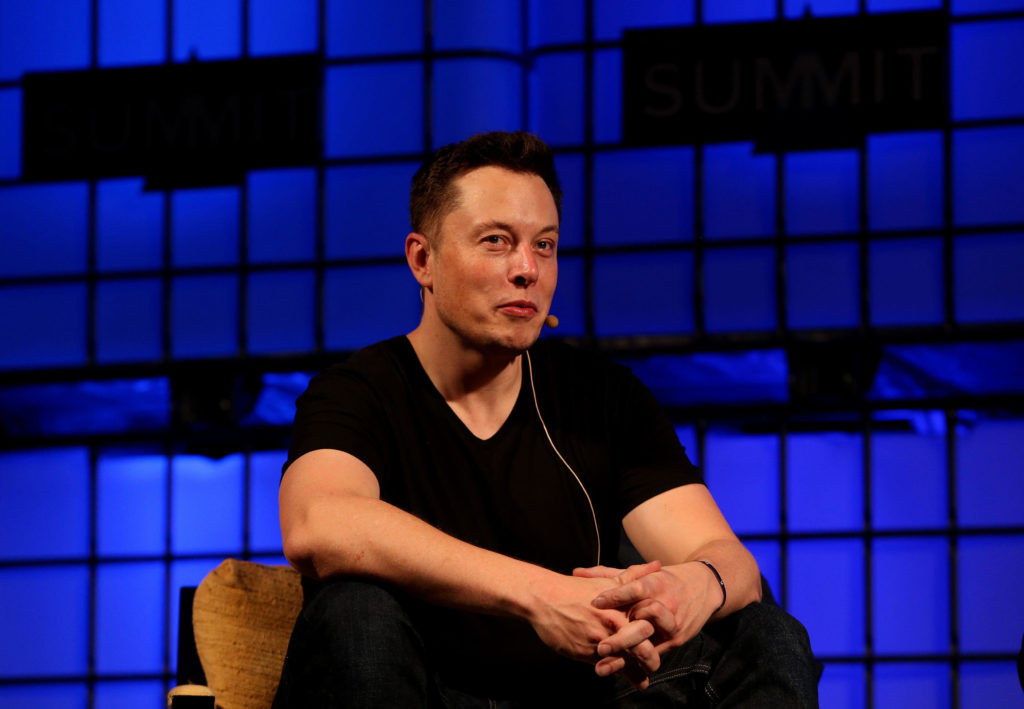
Not surprisingly, yesterday’s blog post stirred things up in radio circles. The thought of AM/FM radios in cars not being standard or simply usurped by other offerings seems unthinkable. Nielsen reports in-car listening is on the upswing, returning to some semblance of “normal.”
So, the idea that some automakers are rethinking their 90-year policy of radios solidly positioned in the center of their dashboards – now known as head units – should send shockwaves throughout the radio business from Napa to New York.
Elon Musk and his amazing Tesla brand are at the center of the movement to remove radios from his world class electric vehicles. But in fairness, the softly spoken secret is that automakers have been throwing the idea at the wall now for years.
So, let’s take a trip in the radio time machine and go back to February 2013 and the Convergence conference in Silicon Valley. This Radio Ink-sponsored event blended technology with radio, a smart get-together from Eric Rhoads and his team.
On the agenda that year was a well-populated “connected car” panel, moderated by Buzz Knight (with Greater Media at the time), Valerie Shuman (Connected Vehicle Trade Association), Frankie James (General Motors), and Thilo Koslowski (then with Gartner).
The session was going swimmingly, until Buzz asked his panelists for final thoughts. And Thilo opined that AM/FM radios might not be standard equipment in new cars, perhaps by 2020 or possibly 2025. Frankie added that in Europe, some automakers were already manufacturing vehicles without over the air radios installed.
 Eric Rhoads heard enough, jumped on stage brandishing a microphone, and demanding more information from the experts. Thilo calmed the situation a bit, but Eric was sufficiently agitated at that point. The next day he wrote, ““A Cold Harsh Reality for Radio: AM/FM Will be removed from The Dash.”
Eric Rhoads heard enough, jumped on stage brandishing a microphone, and demanding more information from the experts. Thilo calmed the situation a bit, but Eric was sufficiently agitated at that point. The next day he wrote, ““A Cold Harsh Reality for Radio: AM/FM Will be removed from The Dash.”
It sounded the alarm, prompting me to write a trilogy of posts titled “The Sky Is Not Falling,” all of which pushed back on Eric’s very public panic attack. My posts pointed to signs there was strong interest among drivers for desiring AM/FM radios in cars, a fact that automakers surely knew. I also spoke to a number of experts with their ears to the ground.
And Eric himself followed up the story with a letter from Phil Abram, GM’s head of infotainment, eager to clarify his company’s policy on the prickly topic of “regular radios” in cars and trucks:
“We can’t speak for other automakers, but to be clear, GM has no near term plans to eliminate AM and FM from GM vehicles. We are committed to providing consumers innovative services that dramatically enhance the driving and riding experience. We expect AM/FM radio to be one of the choices consumers have in our vehicles.”
Perhaps I should have more seriously considered his “no near term plans” loophole. Nonetheless, the kerfuffle at Convergence led to Eric, Valerie Shuman, and Jacobs Media partnering on the first DASH Conference that November, followed by two more in successive years.
Looking back on this incident, I have to believe that Eric was a little early but ultimately right. And I was too overconfident automakers would continue to let history and tradition guide their planning. If we’ve learned anything these past few years, it’s that all bets are off – especially when it comes to cars.
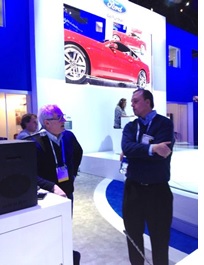
Back then, Paul and I dutifully walked the North Hall at CES every January. Every time we had the chance to talk to an auto exec or rep, we’d eventually get around to asking “the question.” That is:
“Do you ever foresee a day when your company won’t include an AM/FM radio in your vehicles’ dashboards?”
And while most pushed back at the word “ever” – reminding us that “ever” is a long time – they also unequivocally acknowledged they could not foresee that day. That was good enough for me. Despite how the OEMs go about things very differently, their responses to our question all rang similar.
Fast-forward to today. When you ask the question today, you’re liable to get a little pause, maybe even an awkward one. They might avert their eyes and not look at you head-on when answering the question. But if you’re as used to talking to these folks the way we are, you can read the hesitation. They’re not sure. Or perhaps they’ve been in the conference rooms where these conversations might be taking place. That confidence that radio would always be media partners in their dashboard systems isn’t a sure thing.
Part of the reason for instability in a once rock-solid industry is the continued impact of one Elon Musk, the guy behind those hi-tech Teslas. His cars have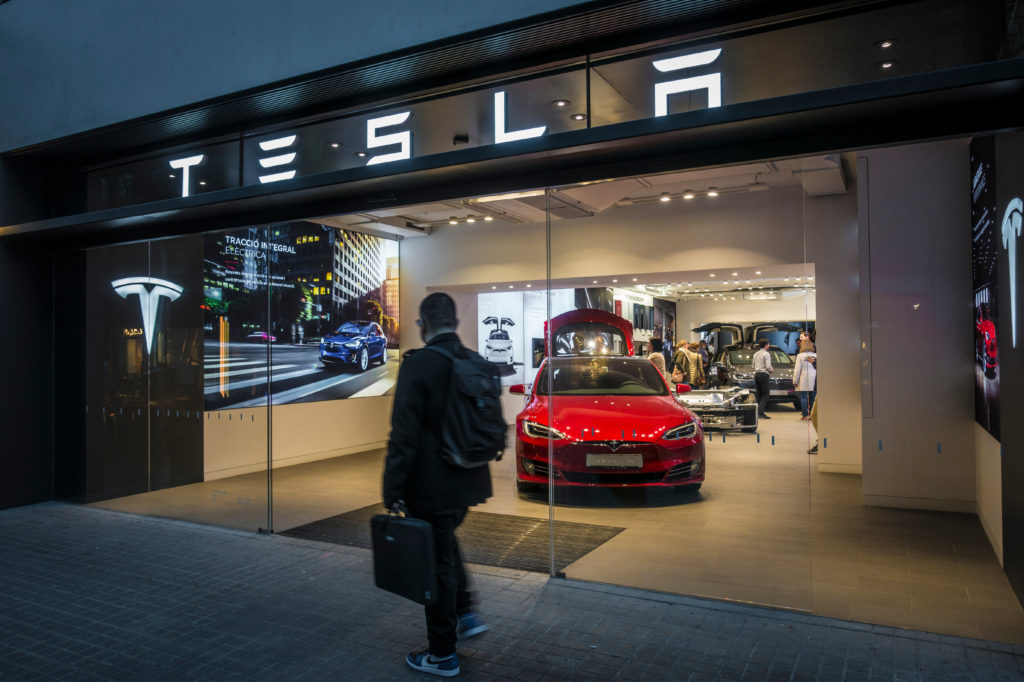 sparked – or set – numerous trends: that electric cars could be exciting, that you don’t need a dealership to sell cars, and that cars could receive software updates that would keep them modern, rather than falling victim to the Big 3’s long-held “planned obsolescence” policy that vehicles should have a short shelf life.
sparked – or set – numerous trends: that electric cars could be exciting, that you don’t need a dealership to sell cars, and that cars could receive software updates that would keep them modern, rather than falling victim to the Big 3’s long-held “planned obsolescence” policy that vehicles should have a short shelf life.
Musk topples conventional wisdom with pretty much everything he does, including Tesla’s built-in practical joke: Model 3s have a “fart mode.” (Yes, it had to have been invented by a man.)
That’s right, on-demand fart sound effects. It’s hard to imagine that feature being available on any vehicle made in Detroit.
As much as conventional automakers may despise the brash irreverence of Elon Musk, they respect what he’s done. Yesterday, Tesla stock closed at an 8-month high, once again vaulting its CEO onto “the richest man in the world” pedestal. How’s your year going? Musk has added $60 billion to his fortunes in 2021 – so far.
The other auto companies are begrudgingly taking notice. And they are slowly but surely incorporating Musk’s operating philosophies in their own companies. And why not? When you look at Tesla’s value, it is greater than most of the other automakers’ revenues – combine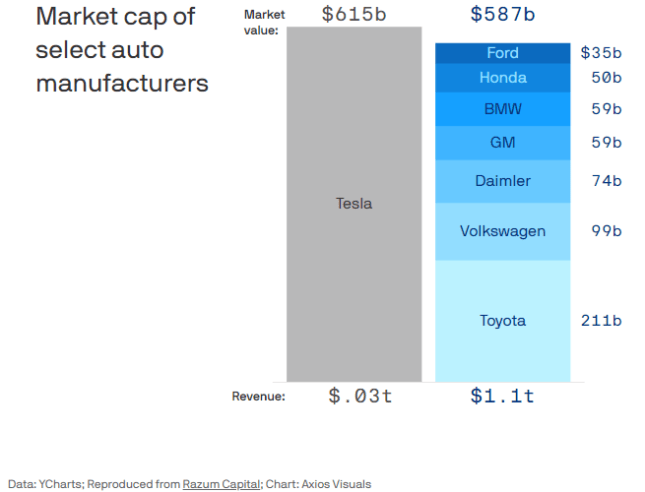 d:
d:
That’s astonishing when you consider Tesla didn’t start up until 2003, and Musk bought his way into the company the following year.
Somehow, a startup has outdone the incumbents, leapfrogging over them all, leaving their traditions shattered in pieces on their showroom floors. With a market cap of well over $600 billion, Tesla and Musk have the swagger to do whatever they want.
Imagine something like that happening in radio – technologists jumping into the business, and a few short years later, lapping the field. You can bet that while no broadcaster would be thrilled about this outcome, they’d all be tasked with analyzing the efficacy of the newcomer’s operating philosophy. And in short order, they’d adopt (or copy) the policies that helped the new venture become #1.
So, what is Musk doing? He is systematically moving his customer base away from radio – broadcast and even satellite. An upgrade package is designed to modernize older Teslas.
For these new features, Tesla not only charges $1,500 – the car’s owner can no longer access broadcast or satellite radio. Want to get them back? It’ll cost another $500.
But don’t take it from me. Below is an FAQ from Tesla about the Upgrade Package. I’ve crudely underlined the most telling points. Suffice it to say, it is more than just an informative piece on an infotainment package. It is a window to how the company thinks, especially about radio.
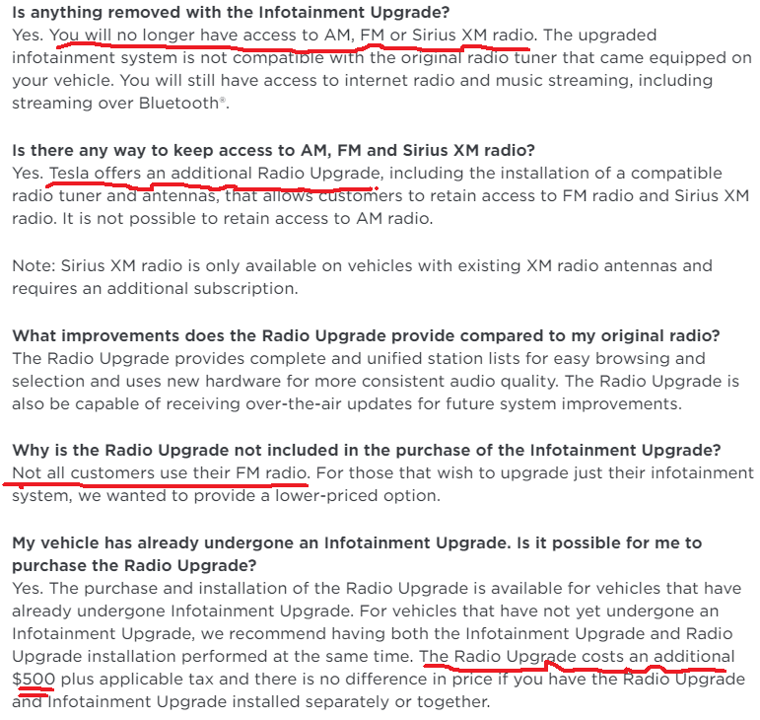
My favorite line? “Not all customers use their FM radio.”
Really? Not all customers listen to Spotify. Or download podcasts. But those audio sources aren’t just accommodated – they’re featured.
We have been told that electrification causes interference problems, especially with AM reception. So, why include it?
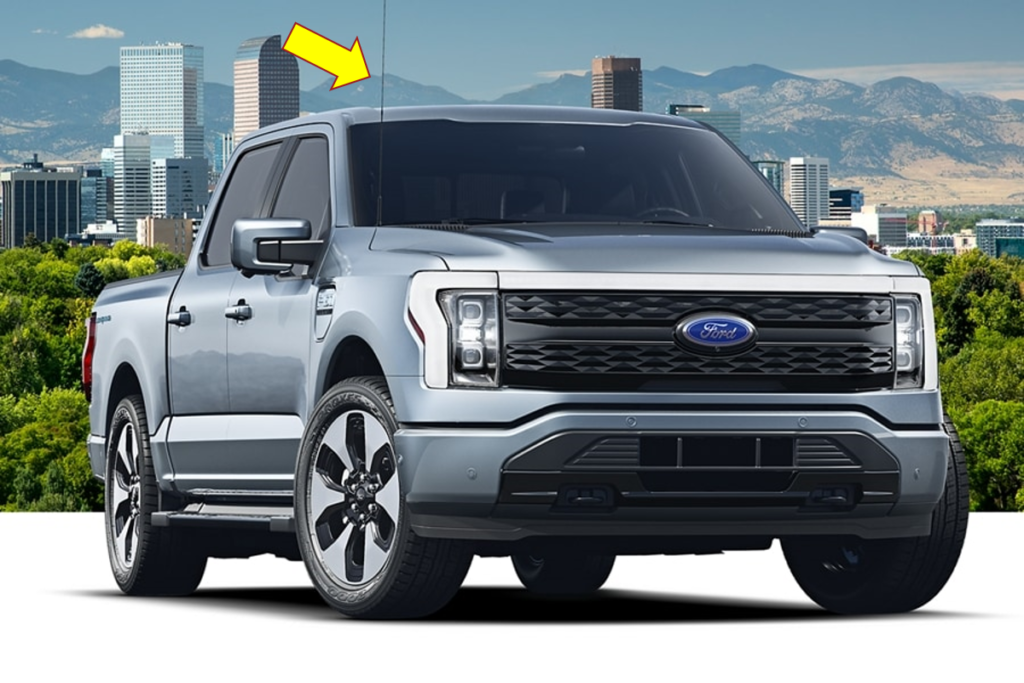
But other car makers seem to have figured out how to bring radio into their electric-powered cockpits. Ford’s new F150 Lighting trucks receive AM and FM without a problem. They even have an old school whip antenna to make sure reception is optimal, much to the chagrin of auto aestheticists.
Somehow, Tesla can engineer a car to flatulate on-demand, but it struggles with picking up AM radio. But let’s make it difficult – and expensive – to get FM radio, too.
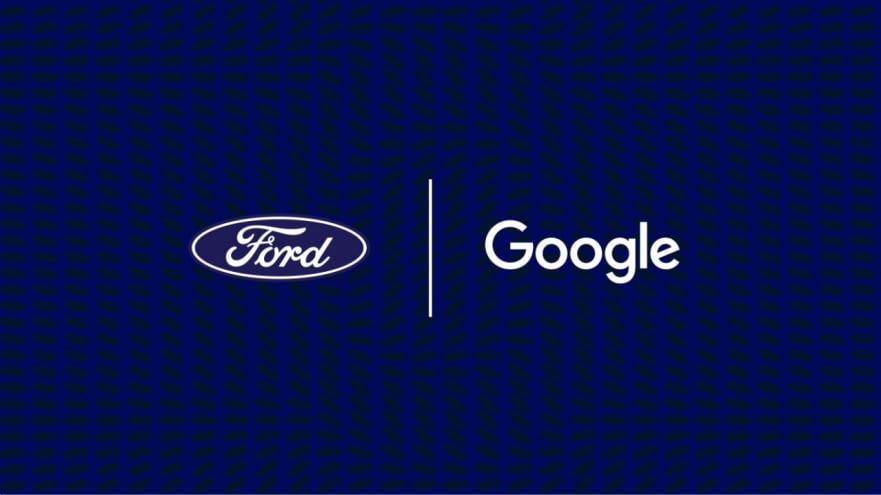
Meanwhile, Google and Apple are continuing their domination of the other car makers. (Apple CarPlay isn’t accessible in Teslas, nor is Apple Music, as Musk and Tim Cook don’t play nice with one another.) But pay attention: their in-car ecosystems will soon control more than just the entertainment system.
Google Automotive Services is locking down OEMs, signing Ford earlier this year. You won’t need your Android phone to operate its features because it’s what’s known as a deep integration, controlling everything from climate to the windshield wipers to, of course, the media system via voice.
Not to be deterred, Apple’s IronHeart system essentially offers similar functionality. It will make Apple an even more powerful player in the automotive space, once again controlling the infotainment system, along with most other car functions. There are questions whether car companies will give up more control of their vehicles to Apple. They did with CarPlay.
 Right about now, you might be asking yourself, “But who owns the data?” And in fact, from the standpoints of the OEMs, and Apple and Google, that might be THE QUESTION.
Right about now, you might be asking yourself, “But who owns the data?” And in fact, from the standpoints of the OEMs, and Apple and Google, that might be THE QUESTION.
When you talk with auto execs about the prospects of disappearing radios in the dashboard, they are generally noncommittal. Often, they’ll say something like, “But you’d still be able to listen to radio in the car through your phone.”
And that sums up their sensitivity to AM/FM radio. They will tell you they grew up listening to the radio, and they might have a favorite personality or show even today. But as the conversation continues, they might remind you none of their kids listen to radio, having gravitated to YouTube, Spotify, and other platforms. And that pretty much sums up their awareness of what is happening in radio, and the sensitivity to broadcasters.
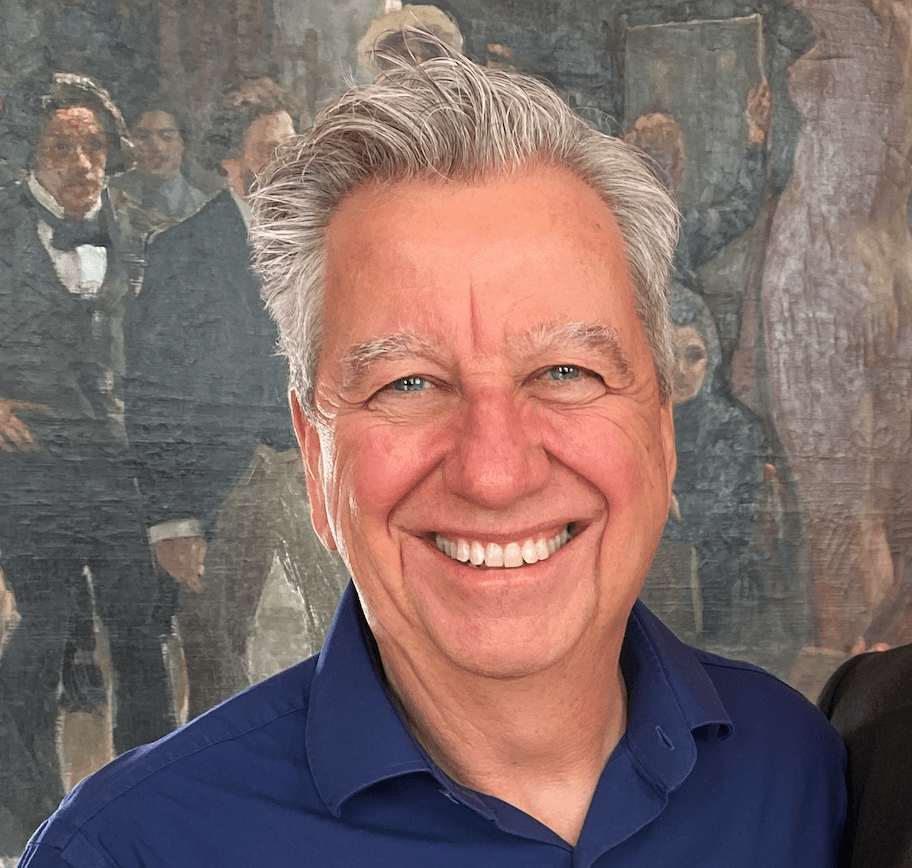
So, Eric Rhoads may have been right when he jumped on that stage back in 2013. But realistically, it will be some time before a true crisis in cars affects radio at scale. When you consider the average vehicle on the road in the U.S. is now 12 years old, it will take at least a decade for this existential problem to become a “hair on fire” industry emergency.
Some of you are no doubt thinking that by 2030, your radio career will have wrapped up, you’ll be in sunny climes, whiling away your retirement on the golf course. It will be somebody else’s problem.
I reject that. If you’ve made a living off this business for a decade or more, you have an obligation to the next generation or two of radio pros. That means paying it forward, making a bona fide attempt to help solve the industry’s problem before you get the gold watch and they show you out the door.
Tomorrow, I’m going to do my best to conjure up solutions – action steps that radio can take now to try to guarantee a viable future in a media world that gets more competitive and complicated by the day.
I promise you it’ll be a much shorter post.
You can read part one, “Why My Car Radio Paranoia Is Back (And Yours Should Be, Too)” here.
And part three – “Addressing My Car Radio Paranoia 3: Let’s Fix It” – here.
- Media And Technology In 2025: Believe It Or Not! - April 18, 2025
- In Radio, You Just Never Know - April 17, 2025
- The Secret To Making A Great Podcast (And Great Radio) - April 16, 2025




A problem I have experienced with the last two vehicles I owned is reception. The stock radios that were installed in 2010-2018 model cars are subpar, IMHO. Once upon a time, you had Philco making radios for Ford, Delco for GM, and so on. Now, the focus is on sound with Bose, B&O, THK, and Pioneer manufacturing car systems. But without proper FM reception, even the best speakers can’t make up the frustration of finding stations to listen to.
In recent years, AM radio sounds abysmal. IMO FM radio sounds fine (the processing in PPM markets has degraded the audio quality somewhat), but still sounds much better than satellite radio. Thanks, Chris.
Thanks for the memories… to take a step further, you, me and your brother met with the heads of Toyota, Ford and GM and probed this idea of no radio. They said it was likely to happen in the future. We then shared stats in radio. I remember one of them saying, “ I had no idea, we assumed everyone was digital and no one was listening to radio anymore.” That resulted in a short term commitment.
We as an industry, NAB,RAB and CEOs of big companies need to make this a high priority to get with high level auto CEOs and make sure a digital generation dashboard committee knows the facts about radio. It needs to happen annually and it’s a huge priority. And though I hate forcing regulation, that may be the next step.
Loosing the car won’t fare well for radio and more importantly the high percentage of consumers who rely on it daily.
I have a Tesla and did not upgrade my firmware because it removed AM radio. But after a while missing out on other options gave me no choice. And I can listen to podcasts in the car, which is truly wonderful. But it does not bode well for AM and won’t for FM. And because Elon Musk tends to determine what is and isn’t cool, it won’t help radio because if Elon pulls radio other car companies will follow. Maybe Bob Pittman or someone who hangs in those circles can meet with Musk and help him understand a different perspective.
Keep in mind, I’ve never wanted this to be true. But in 1997 I said this day was coming and was the laughing stock of the CEO suite. I even started a conference called convergence to help radio adopt digital audio and I went to the big companies in radio to invest. Most said nothing will ever kill radio. I started a digital audio company (radio central) and was called a traitor, and I started the DASH conference along with Jacobs, to try and stop this freight train. We held them off for a while, but digital audio in its various forms cannot be stopped ( nor should we ever have tried to stop it) but if we can be one of many features in the dash our listeners will continue to use us.
I still listen to radio in my car via TuneIn ( disclosure I consulted them and have stock options) but keeping receivers in cars is still important, if for no other reason than emergency.
Let’s start DASH again and see if we can keep interest in radio alive.
Eric, thanks for this. I may want to publish this as part of tomorrow’s “Now What?” post. I truly appreciate your comments, your perspective, and passion. The automakers don’t know radio’s story because with the exception of DASH, the NAB’s work, Xperi, and a few other instances, we don’t as an industry effectively tell it.
Your Tesla story is one I’ve heard before. I don’t think too many broadcasters long for the day when the TuneIn app will be the only way drivers will be able to listen to the Bone in the car.
Your CEO idea is an interesting one – a timely conversation in the Hamptons perhaps. Then again, I know about a conference in NYC where they all show up. Maybe there’s an opportunity.
Great to hear from you.
What exactly is radio’s story? I don’t think radio’s answer is to tell its story better, its to have a better story to tell.
Radios will probably be in cars as long as most car buyers want them – if at some point, most don’t care much, they’ll disappear. And if/when that day comes, it will be too late to reverse and trigger a quick and serious decline for radio.
Tesla is the canary in the coal mine and with Christmas barely two months away, radios traditional “firin’ season” is just around the corner. Those two things happening simultaneously are absurd to the point of comedy.
Radio CEOs meeting with auto maker CEOs is a good idea, but I’d suggest getting some new radio CEOs first.
Oh Bob.
I went to one of Eric’s conferences in CA in the late 90’s on the upcoming internet/digital revolution.
I was struck by the fact that the Newspapers realized the threat/possibilities of what laid ahead and formed Cars.com but the radio people were only interested in the multiples of the recent sales which seemed to be happening daily at that time.
There was absolutely no way we could look out beyond our little fiefdoms and pool our substantial recourses/audiences though some, like the Regional Help Wanted tried. They were most successful in markets where they had the most radio concentration but a lot of groups didn’t want to share the spoils with others.
Shakespeare was right – the problem is not in our stars but in ourselves.
Strong comment, Mike. I remember those times the same as you do. No one wanted to even talk digital. In retrospect, opportunities missed.
Thank you for the last two articles. Amazing and thank you. I read today that in 1985, on this day, the first Blockbuster Video opened in Dallas. Doesn’t seem that long ago, does it. There is still one Blockbuster open today, but that’s it. Times change and they change quickly. My buddy bought his 2020 Tesla and AM radio was a $2,400 option. He did not get it and has moved on……and many will. Is AM radio really worth $2,400? Elon is the Netflix – the other car manufacturers are the Blockbuster. I wish Eric would get on a stage now and tell Radio to get their act together and seriously investing in platforms other than AM and FM……Radio continues to be moving at a snails pace. Will radio end up like Blockbuster?
I think this analogy is perfect, Don. And I say that with sadness. Thanks for reading the blog and offering up an insightful comment.
This is not your daddy’s automaker.
Hard to image a Ford or GM suit blasting into space.
Back when Eric wrote that piece we were still thinking of auto execs as those flying to Washington in private jets asking for government bailouts.
We can’t imagine a world without GM for Ford types … maybe we should?
Yes, no auto CEOs go to space – and make cars that fart. It’s a very good sign.
Echoing Don…this blog is on fire as of late!
Thank you!
Great post, Fred – and the exchange with Eric brings back a lot of memories of the rather heated environment that preceded the creation of the Dash conferences. Eric’s remarks on the 2013 Convergence stage were provocative – and visionary – but broadcasters did not want to hear any of it. There was more than one “call for his head”, so to speak – one even threatening to ruin him for making such bold, unsettling prediction. And at the end of the day, that’s always the problem – ignore it until it becomes so big it becomes unsurmountable. Are we at that point yet? Can we reverse the course – or at least amend it so we don’t get sidelined forever more? Maybe it’s time for Dash again.
“Nothing is confirmed until it is officially denied.” — R.A. Heinlein
Thanks, Deborah. We just hosted a private conference here, ironically in the DASH room at the Detroit airport. Talk about a flood of memories! I don’t know whether we can reverse the current path or whether as you wonder, whether it’s too big a wall to clear. I do know this, we were all on the right side of this issue eight years ago, and we should be proud of that. But here we are, and we can’t do nothing. Let’s talk soon.
I think Bob Bellin’s comment makes one of the better points here:
“What exactly is radio’s story? I don’t think radio’s answer is to tell its story better, its to have a better story to tell.”
Can broadcasters produce a better product than Spotify? Sirius? Not every drives a Tesla, but having radio as an “option” goes back to the late 50’s when your dashboard just had metal plugs where the tuner used to be.
The car is the place people still use radio the most. If these people have their way the paid services will have the ears of the former faithful RF receivers. Does radio have time to wait?
I have to push the old panic button, but no, radio doesn’t have time to wait. Appreciate it, Dave.